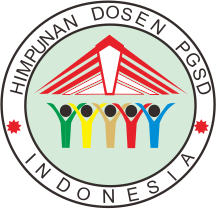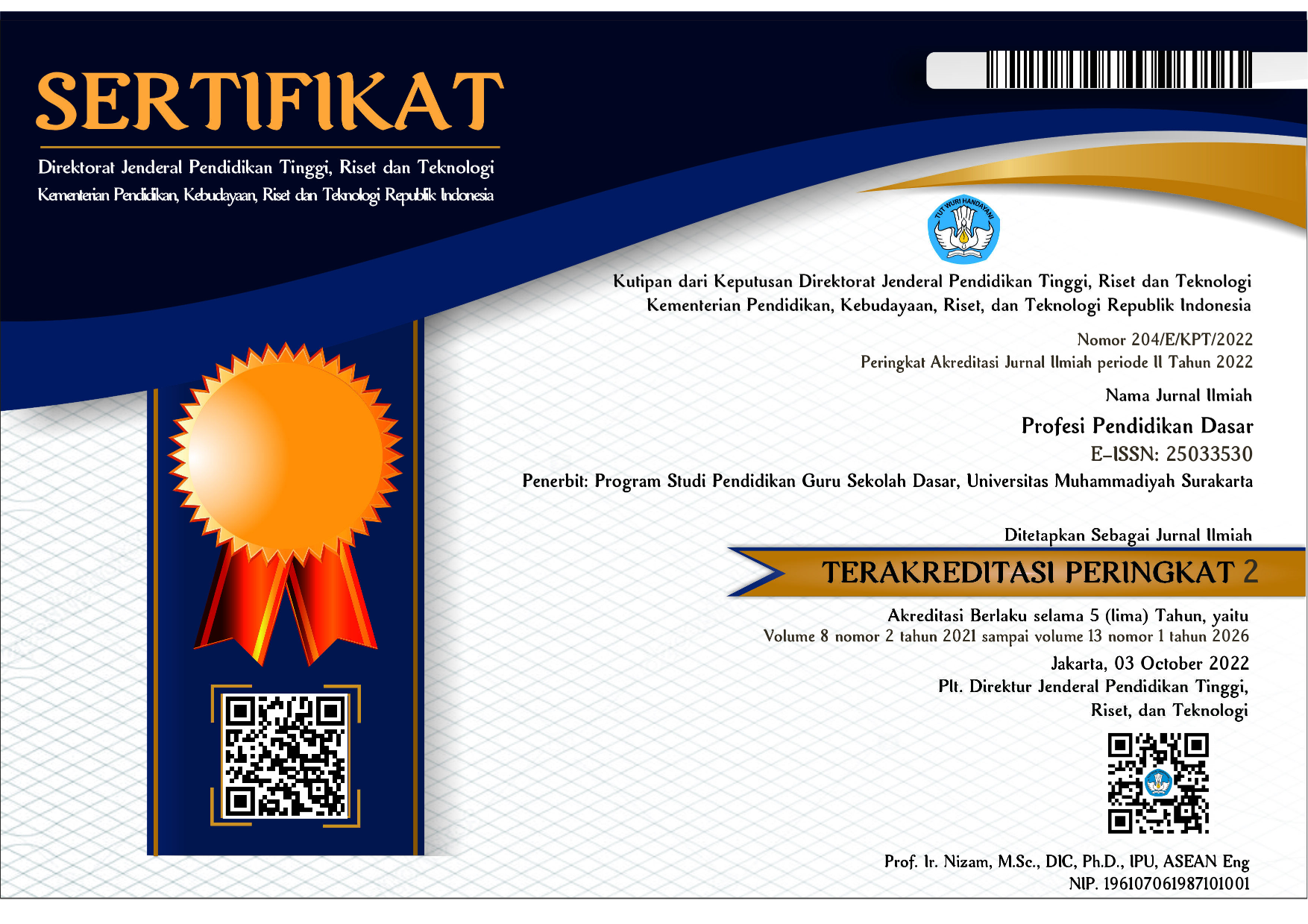Teacher's Use of WhatsApp Application to Solve Elementary School Students' Online Learning Difficulties
Eko Kuntarto(1), Faizal Chan(2), Nurul Qalbi Eka Pratiwi(3*)(1) Universitas Jambi, Jambi
(2) Universitas Jambi, Jambi
(3) Universitas Jambi, Jambi
(*) Corresponding Author
Abstract
Keywords
Full Text:
PDFReferences
Afnibar dan Fajhriani. (2020). Pemanfaatan WhatsApp Sebagai MediaKomunikasi Antara Dosen Dan Mahasiswa Dalam Menunjang KegiatanBelajar (Studi Terhadap Mahasiswa Uin Imam Bonjol Padang. JurnalKomunikasi dan Penyiaran Islam.Vol.11(1).70-83.
Ahmadi, Rulam. 2016. Metodelogi Penelitian Kualitatif. Yogjakarta: Ar-Ruzz Media
Alaby, M. A. (2020). Media Sosial Whatsapp Sebagai Media Pembelajaran Jarak Jauh Mata Kuliah Ilmu Sosial Budaya Dasar (ISBD). Ganaya: Jurnal Ilmu Sosial Dan Humaniora, 3(2), 273–289.
Amry, A. B. (2014). The impact of WhatApp mobile social learning on the achievement and attitudes of female students compared with face to face learning in the classroom. European Scientific Journal, 10(22), 116–136.
Dewi, W. A. F. (2020). Dampak COVID-19 terhadap Implementasi Pembelajaran Daring di Sekolah Dasar. Edukatif : Jurnal Ilmu Pendidikan, 2(1), 55–61.
Hartono. (2012). PAIKEM Pembelajaran Aktif, Inovatif, Kreatif, Efektif, dan Menyenangkan. Pekanbaru : Zanaf.
Indaryani, E., & Suliworo, D. (2018). Dampak Pemanfaatan WhatsApp Dalam Meningkatkan Motivasi Belajar Siswa Pada Pelajaran Fisika. Prosiding Seminar Nasional Quantum, 25, 25–31.
Kamila, H. P., (2019). Pengaruh Pemanfaatan Media Sosial Whatsapp TerhadapMotivasi Belajar Bahasa Indonesia Di Smp Islam Al Wahab Jakarta Tahun Pelajaran 2018/2019. (Skripsi Mahasiswa Ilmu Tarbiyah Dan Keguruan Uin Syarif Hidayatullah)
KBBI. (2016). Kamus Besar Bahasa Indonesia. (KBBI). [online].
Mulyadi. (2010). Diagnosis Kesulitan Belaja dan Bimbingan Terhadap Kesulitan Belajar Khusus.
Narti, S. (2017). Pemanfaatan “Whatsapp” Sebagai MediaKomunikasi Dosen Dengan Mahasiswa Bimbingan Skripsi(Studi Analisis Deskriptif Pada Mahasiswa Ilmu Komunikasi BimbinganSkripsi Universitas Dehasen Bengkulu Tahun 2016). JurnalProfessional, 4(1).
Purwanto, A., Pramono, R., Asbari, M., Santoso, P. B., Wijayanti, L. M., Choi, C. H., & Putri, R. S. (2020). Studi Eksploratif Dampak Pandemi COVID-19 Terhadap Proses Pembelajaran Online di Sekolah Dasar. EduPsyCouns: Journal of Education, Psychoslogy and Counseling, 2(1), 1–12.
Sadikin, A., & Hamidah, A. (2020). Pembelajaran Daring Di Tengah WabahCovid-19(Online Learning In The Middle Of The Covid-19Pandemic.JurnalIlmiah Pendidikan Biologi.Vol.6(2). 214-224
Shodiq, I. J., & Zainiyati, H. S. (2020). Pemanfaatan Media Pembelajaran E-Learning Menggunakan Whastsapp Sebagai Solusi Ditengah Penyebaran Covid-19 Di Mi Nurulhuda Jelu. Al-Insyiroh: Jurnal Studi Keislaman, 6(2), 144–159.
Sugiyono. 2005. Metode Penelitian Bisnis. Bandung: Alfabeta
Suryani, R. (2017). Fungsi WhatsApp Grup Shalihah Cabang Bandar Lampung Sebagai Pengembangan Media Dakwah Dalam Menentukan Akhlakul Karimah.
Sahidillah, M.W., & Miftahurrisqi, P. (2019). WhatsApp sebagai media literasi digital siswa. Jurnal varadika kajian penelitian pendidikan, 31(1),52-57.
https://journals.ums.ac.id/index.php/varidika/issue/view/850
Trisnani. (2017). Pemanfaatan WhatsApp sebagai Media Komunikasi danKepuasan Dalam PenyampaianPesan Dikalangan Tokoh Masyarakat.Jurnal Komunikasi, Media DanInformatika, 1–12.
Wiguna, R., Sutisnawati, A., & Lyesmaya, D. (2020). Analisis Proses Pembelajaran Siswa Berbasis Onine di Kelas Rendah Pada Masa Pandemic conid-19. Jurnal Perseda, III(2), 75–79.
Article Metrics
Abstract view(s): 694 time(s)PDF: 584 time(s)
Refbacks
- There are currently no refbacks.


















